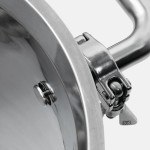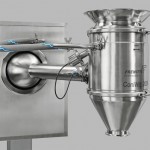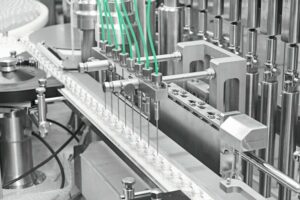In fine milling, product accumulates in and on corners, edges, recesses and shaft bushings. The only way to dislodge these residues is by using large amounts of cleansers. These factors were taken into account in the design of the ConiWitt conical sieve mill. The ConiWitt is also now available in a CIP design.
The most important goal when designing the ConiWitt was to obtain a shape that is free of dead spaces. In order to achieve this goal, Frewitt opted for a monoblock design. The milling head consists of a monoblock with high-quality surfaces (most of which are perpendicular) and a rounded drive and drive shaft. All metal contact surfaces of the CIP model are sealed off from the milling chamber with O-rings. The transitions between the rotor and the shaft, the conical sieve and the bevel gear and the conical sieve insert and the housing are hermetically sealed. The seals do not interfere with dismantling/installing the sieve and rotor, which are just as easy to change in the CIP model as they are in the standard model.
The CIP jets ensure thorough coverage of all parts and surfaces of the milling head with the washing fluid, which bonds to solid residues so that they can be rinsed away. A controlled cleaning process is ensured by the precise setting and regulation of pressure, flow volume and flow velocity.
WIP or CIP cleaning?
The parts in contact with the product are made from 1.4435/1.4404 (AISI 316L) grade stainless steel. All weld seams are buffed and polished. Product contacting parts are configured with polished Ra #0.4 μm or Ra #0.8 µm surface finishes. The seals are made of FDA compliant materials (EPDM/PTFE).
The modular design of the sieve mill allows flexibility when configuring the cleaning process. The steps necessary for WIP cleaning are:
- Washing and pre-rinsing with water (to bond solid residues)
- Dismantling the rotor and sieve (they are cleaned separately)
- Sieve mill cleaning cycle with the rotor and sieve removed
- Drying the milling chamber
- Installation of the clean rotor and sieve
The first step in CIP cleaning is pre-rinsing with cold water. Next comes the wash cycle with cleanser at different pH levels and high temperature, followed by two rinse cycles with tap water and with aqua purificata laboratory grade water, and lastly drying. WIP cleaning is recommended for mobile (stand-alone) units and non-critical products, while CIP cleaning is usually compulsory for closed (inline) processes.
The Frewitt conical sieve mill is equipped to allow the customer to select either WIP or CIP cleaning. CIP cleaning, however, does not include sterilisation. If a given procedure requires sterilisation, the customer can dismantle the milling head man-ually in two easy steps and sterilise it in an autoclave.
Many applications in the food, chemical, and pharmaceutical industries are supported with the option either of performing CIP cleaning on the conical sieve mill after the active substances have been fine-milled in a closed process or of carrying out WIP cleaning and sterilising the milling head in an autoclave after milling non-critical products with a stand-alone unit. To this end, the user can choose between the 150, 200 and 250 ConiWitt models. Frewitt has verified the ConiWitt’s faultless cleanability with the riboflavin wetting test for low germ counts or sterile process engineering. The documented test result confirms the design concept of the ConiWitt sieve mill.
Online-Info www.cpp-net.com/2310461
Share:








